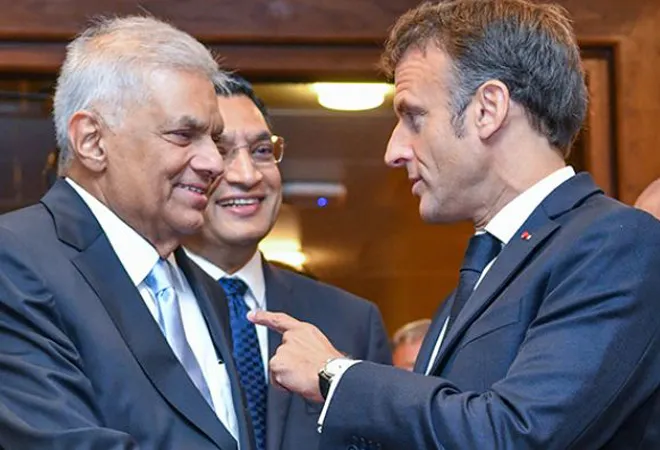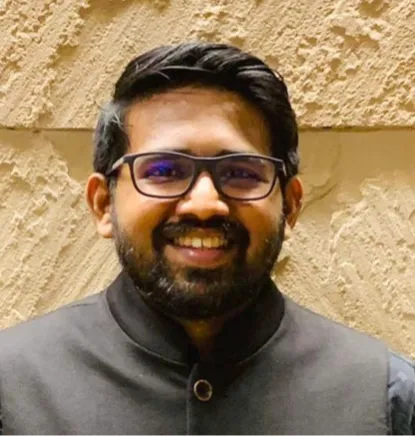-
CENTRES
Progammes & Centres
Location
President Macron’s recent visit to Sri Lanka intends to provide a larger diplomatic canvas for both countries to strengthen their geopolitical ties and work towards Sri Lanka’s economic recovery

On the heels of his South Pacific Islands visit, French President Emmanuel Macron’s visit to Sri Lanka on 28 July 2023 was a first of its kind. While the visit lasted just more than an hour, it underscored France’s increasing interest in Colombo and the growing importance and agency of South Asian countries within the Indo-Pacific region. This visit was significant as the two countries marked the 75th anniversary of their diplomatic ties and intended to elevate relations to open a new era of partnership. Essentially, both leaders discussed debt restructuring, tourism, economy, climate change, sustainable development, maritime activities, and initiating high-level diplomatic engagements. This article looks at the rationale behind the French outreach to Sri Lanka and the importance of this visit.
France had not accorded enough geopolitical attention to Sri Lanka for a long time; however, it has been playing a critical role in the Core Group on Sri Lanka at the United Nations Human Rights Council (UNHRC) on the issues related to the war crimes—much to Sri Lanka’s displeasure. Its economic relations are also minuscule with total trade between the two countries at US$383.4 million in 2021. In recent years, two developments have led France to re-assess its outreach towards this country.
As the competition in the region increases due to challenges from a rising China and increasing US-China rivalry, France is concerned about the spill-over effects.
First, is the realisation of the importance of Colombo in the Indo-Pacific region. As the competition in the region increases due to challenges from a rising China and increasing US-China rivalry, France is concerned about the spill-over effects. This also stems from the fact that it lays a major claim in the region’s exclusive economic zones vide French Polynesia, Futuna, and New Caledonia in the Pacific and Réunion Island in the Indian Ocean. Moreover, during his visit to the country, President Macron pointed towards the importance of Sri Lanka as an Indian Ocean country with which it shared a common goal of preserving the free and open Indo-Pacific. Also, Paris considers Colombo its neighbour, primarily due to its geographical proximity to Réunion Island. Therefore, any disruption in the regional order will have lasting implications for French interests.
Second, is the increased outreach to Sri Lanka by major countries. India, the United States (US), China, and Japan are engaging with Colombo at various levels. While India shares traditional relations with Sri Lanka, it has made consistent efforts to make this partnership transformational in recent times. Similarly, Japan has also stepped up its developmental partnership and investments with Colombo, while the US has increased its diplomatic outreach to the country. These outreaches are also influenced by China’s increased activity in the region. Beijing considers Colombo an important and strategically-located country on its East-West trade route in the Indian Ocean and a crucial partner in its Belt and Road Initiative. China has also extended assistance to Colombo in terms of multi-billion dollar loans. For France, this outreach towards Sri Lanka thus appears to be part of President Macron’s plan to carve out an independent role for itself in the vital Indo-Pacific region.
Beijing considers Colombo an important and strategically-located country on its East-West trade route in the Indian Ocean and a crucial partner in its Belt and Road Initiative.
As a result, France offered nearly US$1.5 million to Sri Lanka during the economic crisis. At a time when major powers hesitated to invest in the country and paused their projects, France offered grants to promote renewable energy. It also provided humanitarian and medical assistance to the country. In addition, the European Union (EU) offered aid worth US$6 million and promised to promote green energy in the country. Further multilateral assistance also came in from France through negotiations on debt restructuring with the Paris Club members and the G7 countries. These negotiations with the Club resulted in debt restructuring assurances that enabled Sri Lanka to access the first tranche of its International Monetary Fund (IMF) package.
Being the fourth-largest bilateral creditor to Sri Lanka, France has also joined India and Japan to launch and chair a common platform/creditor committee to discuss Sri Lanka’s debt-restructuring programme with nearly 17 other countries. The initiative helps Sri Lanka with a common debt restructuring plan and comparability of treatment (equal treatment) towards all their official bilateral creditors. This initiative will assist Sri Lanka in restructuring its debts, promoting economic recovery, and continuing to access the subsequent tranches of the IMF package.
The initiative helps Sri Lanka with a common debt restructuring plan and comparability of treatment (equal treatment) towards all their official bilateral creditors.
Given this interest in Sri Lanka, it was no surprise that President Macron invited President Ranil Wickremesinghe to France to address a panel discussion on the New Global Financing Pact. During the visit, the Sri Lankan president met several members of the Paris Club and also discussed the nature of bilateral relations with his French counterpart. This brewing interest underscores Macron’s recent visit to Sri Lanka.
On the other hand, Sri Lanka also sees significant benefits from France’s growing interests in the country. For one, France’s interests in the region provide an opening for Sri Lanka to further its agency and leverage in the new world order. Throughout its post-independent history, Sri Lanka has always sought good relations with countries such as Pakistan, the US, and China in order to push back against India and avoid its over-dependence (political and economic) on the latter. It has de facto maintained a stance of “the more, the merrier approach” in its foreign policy and development partnerships. With the Indo-Pacific region now growing in prominence, Sri Lanka is maintaining a balance with major powers of the region—India, the US, Japan, Australia, China, and Russia—sometimes at certain diplomatic and economic costs. In this regard, Sri Lanka finds France’s balancing rather than confronting foreign policy beneficial to its interests and less detrimental to its pre-existing partners.
Second, France is also a crucial partner for Sri Lanka’s debt restructuring. While India, Japan, and France have launched the common platform and asked China to take part in the initiative, geopolitics has limited the success of this initiative. China has, in fact, declined this proposal and offered Sri Lanka a bilateral deal. This is a major challenge in Sri Lanka’s debt restructuring process since the Paris Club countries have asked Colombo to avoid any bilateral negotiations. One of the potential reasons for China’s response is its scepticism and unpleasant relations with India, Japan, and the West. It perceives this initiative as unfair to Chinese loans and repayments since China is Sri Lanka’s largest creditor. Therefore, the onus is now on “balancing” France to make progress in these negotiations with China; and President Macron too assured President Wickremesinghe of his continued engagement with Beijing on debt restructuring.
One of the potential reasons for China’s response is its scepticism and unpleasant relations with India, Japan, and the West.
Third, Sri Lanka looks at France as a potential development partner. From 2005, France’s development agency (AFD) has offered Sri Lanka assistance of nearly 360 million euros. The AFD has continued to invest in promoting the country’s green energy, health, education, water treatment, fishing harbours and villages, urban development, agriculture, etc. For Colombo—a slowly recovering economy that is realising the impacts of unsustainable borrowing—France’s assistance and partnership will be crucial. It might help the country with socio-economic development and also promote a self-reliant economy. Incidentally, Macron’s recent visit has assured the establishment of an AFD office in Sri Lanka and rekindled the need for cooperation with France in the water and energy sectors. With the hopes of promoting renewable energy, Wickremesinghe has also shown interest to participate in France’s Paris Agenda for People and Planet.
Similarly, Sri Lanka also sees France as a potential partner in the maritime security domain. At a time when Sri Lanka is promoting defence reforms and focusing on maritime security and threats, France—a resident power in the Indian Ocean—could be a viable partner. This would help bolster maritime and common security for both countries. Even with Macron’s recent visit, France agreed to establish a school for maritime safety and security in Sri Lanka and promote efforts to combat human trafficking. Macron also expressed interest in collaborating with Sri Lanka in its chairmanship of IORA, and Sri Lanka is considering being an observer state in the Indian Ocean Commission.
In short, the quick visit by President Macron signified the growing importance of the French engagement in Sri Lanka and its keenness to diversify its relations. The visit intended to provide a larger diplomatic canvas for both countries to strengthen their geopolitical ties and work towards Sri Lanka’s economic recovery. This visit has put relations between both countries on a positive trajectory. But going ahead, the extent of these bilateral relations will be determined by issues of Tamil reconciliation and human rights; France’s capabilities and interests to robustly invest and interact with Sri Lanka; and Sri Lanka’s ability to balance with other major powers without impacting France’s interests and sensitivities.
Aditya Gowdara Shivamurthy is a Junior Fellow at the Strategic Studies Programme at Observer Research Foundation.
Ankita Dutta is a Fellow at the Strategic Studies Programme at Observer Research Foundation.
The views expressed above belong to the author(s). ORF research and analyses now available on Telegram! Click here to access our curated content — blogs, longforms and interviews.

Aditya Gowdara Shivamurthy is an Associate Fellow with the Strategic Studies Programme’s Neighbourhood Studies Initiative. He focuses on strategic and security-related developments in the South Asian ...
Read More +
Ankita Dutta was a Fellow with ORFs Strategic Studies Programme. Her research interests include European affairs and politics European Union and affairs Indian foreign policy ...
Read More +